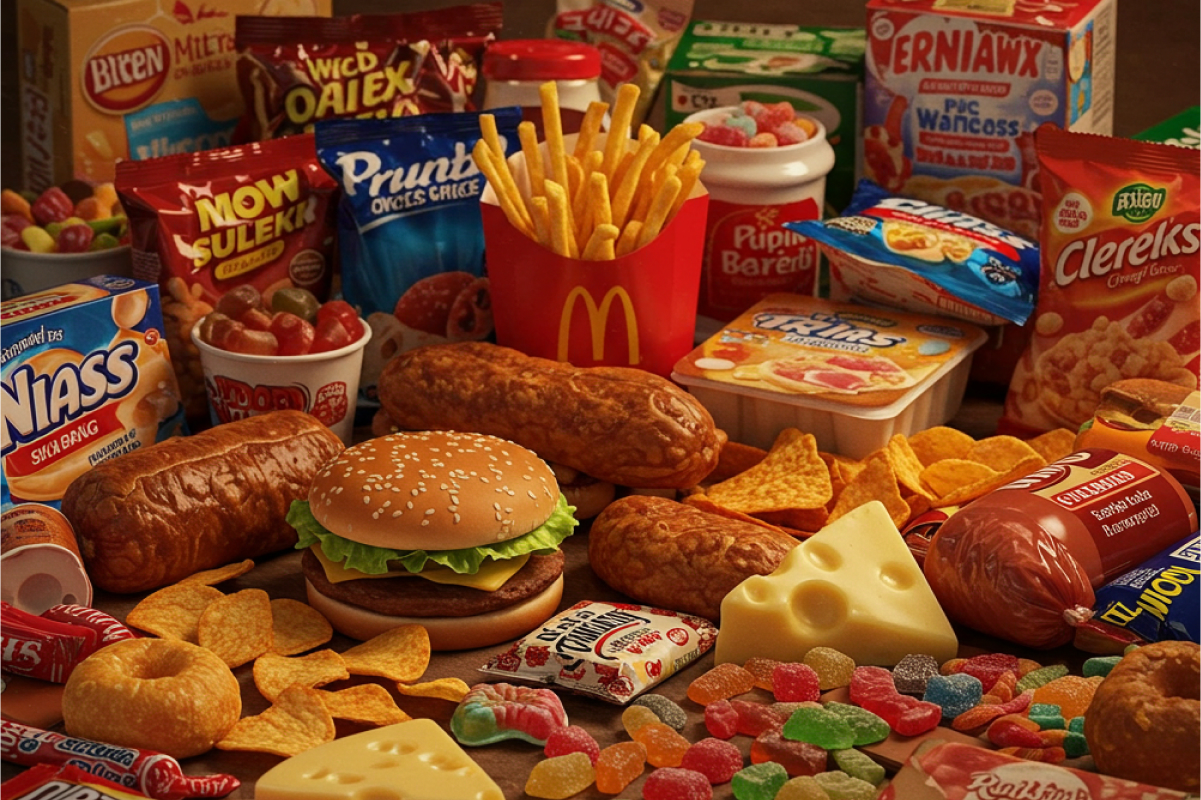Since 1975, global obesity rates have tripled. Behind this epidemic lies a silent culprit: ultra-processed foods—engineered to be irresistible and addictive, but nutritionally void. These aren’t your grandma’s recipes; they’re products of cutting-edge science, designed by some of the smartest minds in the world to keep you coming back for more.
Snacking between meals on ultra processed foods, often advertised as healthy, low fat or sugar free, has become normal for most people, specially children, leading to bad habits as we age. These snacks are deliberately engineered to be cost-efficient to produce with ultra-long shelf lives—putting profit far ahead of health.Here’s how Big Food perfected the art of addiction, its impact on your health, and how you can fight back to reclaim your well-being.
The Science of Craveability
Big Food employs teams of scientists, food engineers, and psychologists to craft foods with just the right combination of flavour, taste, and texture—a phenomenon often referred to as the “bliss point.”
- Flavour Manipulation
- Artificial flavours, sugars including artificial sweeteners and high fructose corn syrup, salt, and fat are meticulously balanced to trigger pleasure centres in your brain.
- These foods create a burst of dopamine, the “feel-good” neurotransmitter, making them highly rewarding.
- Texture and Mouthfeel
- Crispy chips, creamy ice cream, and soft pastries are engineered to create sensory perfection.
- This perfect texture keeps you eating, long past the point of fullness. Soft foods that do not require chewing bypass satiety mechanisms.
- Irresistible Combinations
- The blend of sugar, fat, and salt is deliberately designed to override your natural satiety signals, encouraging overeating.
The result? Foods that are hyper-palatable—delicious to the point of being irresistible and highly addictive.
4. Marketing Appeal
- Big Food uses bright bold colours and vibrant packaging to capture attention and attract buyers.
- Colours like red and yellow are chosen for psychological appeal to evoke hunger, energy, and excitement.
- Packaging often features playful imagery, slogans, fun designs and catchy phrases to create emotional connections.
- Products are strategically placed at eye level in stores for maximum visibility.
- Labels use health buzzwords like “low-fat”, “natural” and “sugar free” to suggest health benefits, even for heavily processed items that are far from healthy.
The objective of packaging and marketing is designed to make products irresistible, prioritising sales and convenience over nutritional value.
High Calories, Low Nutrition
Ultra-processed foods are almost always high in calory density while being devoid of essential nutrients like vitamins, minerals, and fibre. Here’s what makes them so problematic:
- Calory Overload
- A single serving of an ultra-processed snacks or meal can pack hundreds of empty calories, contributing to weight gain without providing the nutrients your body needs. You become overfed but undernourished.
- Nutritional Deficiencies
- Ultra-processed foods are stripped of nutrients and fibre during processing and rely on synthetic additives to mimic “fresh” flavours.
- These foods often have a high glycaemic index and lack fibre, which means they are digested rapidly, causing sharp spikes in blood sugar levels followed by rapid crashes. This constant rollercoaster of blood sugar can overstimulate insulin production, leading to insulin resistance over time—a key driver of Type 2 diabetes. Without the moderating effect of fibre, these blood sugar fluctuations also fuel cycles of hunger and overeating, making it harder to maintain a healthy weight and exacerbating the risk of diabetes-related complications, such as nerve damage, kidney disease, cardiovascular issues and osteoporosis.
- Adding fructose switches off appetite controls leading to overeating.
- Chemical Cocktails
- Additives like emulsifiers, artificial colours, and preservatives extend shelf life but can disrupt gut health and metabolism.
- High fructose corn syrup and artificial sweeteners can disrupt normal appetite controls and cause gut dysbiosis resulting in overeating and poor nutrient absorption.
- Ultra-processed foods are more likely to contain residues of glyphosate, a potential endocrine disruptor linked to obesity, as well as other harmful farm chemicals and additives. They often include pro-inflammatory industrial seed oils, excessive omega 6 polyunsaturated fatty acids (PUFAs), and trans fats—the latter being particularly harmful as they may raise LDL cholesterol and lower HDL cholesterol and promote systemic inflammation.
Together, these bad fats and additives can disrupt metabolic health, contribute to chronic inflammation, affect immune health and increase the risk of cardiovascular disease, Type 2 diabetes, and other chronic conditions, including osteoporosis and sarcopenia.
The Link to Metabolic Disorders and Diseases
The rise in ultra-processed food consumption isn’t just driving obesity—it’s fuelling a wave of metabolic disorders and chronic diseases, including:
- Type 2 Diabetes
- Refined carbohydrates and high sugar content spike blood sugar levels, contributing to insulin resistance.
- Cardiovascular Disease
- Excessive salt and trans fats increase blood pressure and cholesterol, leading to heart problems.
- Osteoporosis
- Diets lacking in essential nutrients, like protein, calcium, vitamins D, C, B & K2, potassium, phosphorus, selenium, iodine, magnesium, copper, which are highly inflammatory can weaken bones over time.
- Sarcopenia
- Diets lacking essential compete proteins and nutrients that promote obesity also contribute to loss of muscle mass (sarcopenia) and strength (dynapenia) as people age.
- Metabolic Syndrome
- The combination of high visceral fat and blood sugar, and elevated triglycerides caused by poor dietary habits increases the risk of many chronic diseases.
Ultra-processed foods don’t just harm your waistline—they jeopardise your overall health, including your bone density and muscle strength, which are critical for independence and mobility as you age.
How OsteoStrong® Can Help You
While reducing ultra-processed foods is essential for improving your health, combining dietary changes with a targeted approach to physical wellness is crucial. This is how the OsteoStrong® program can help you;
Maintain Muscle Mass
- When we lose weight rapidly as we get older, 50% of the weight lost is fat, and the other 50% is usually muscle and fibre (connective tissues) that can be almost impossible to replace. OsteoStrong can help most people build and maintain muscle mass and strength, even if you are losing weight.
Builds Bone Density
- OsteoStrong® uses high-intensity, low-impact exercises to stimulate bone growth, reducing the risk of osteoporosis and fractures as you age.
Improves Muscle Strength
- The program helps preserve and enhance muscle mass, which is vital for metabolic health and maintaining balance and mobility as you age.
Enhance Metabolic Health
- Strong muscles and bones support better glucose regulation, reducing the risk of Type 2 diabetes and other metabolic disorders. OsteoStrong has been demonstrated in a 2015 UK Study by Hunte et.al. to be twice as effective at reducing blood glucose than leading medications.
Reduces Fall and Fracture Risk
- By strengthening both muscles and bones, OsteoStrong® helps you maintain your independence and mobility, so you can continue living life on your terms.
In short, OsteoStrong® can be a game-changer in helping you bounce back from poor diet choices and take control of your long-term health.
Breaking Free from Big Food’s Grip
To combat the health risks posed by ultra-processed foods, it’s essential to make informed choices and take control of your diet and physical health.
- Prioritise Whole Foods
- Focus on fresh fruits, vegetables, whole grains, lean proteins, and healthy fats. These provide the nutrients your body needs to function optimally.
- Incorporate Resistance Training
- Strength programs like OsteoStrong provide targeted support for improving muscle and bone health, essential for healthy ageing.
3. Read Labels Carefully
- Avoid products with long ingredient lists full of unrecognisable additives. If it contains an ingredient that is not in your home kitchen, don’t buy it! Look for minimally processed options.
4. Cook at Home
- Preparing meals and snacks from scratch allows you to control what goes into your food, avoiding unnecessary sugars and additives.
5. Practice Mindful Eating
- Pay attention to your hunger and fullness cues and avoid eating out of boredom or stress.
The Bigger Picture
The global rise in metabolic disorders and chronic diseases is no accident—it’s the direct result of a food system designed to prioritise profit over health. Ultra-processed foods have created a perfect storm for obesity and disease, but with the right strategies, you can take back control.
By eliminating ultra-processed foods, focusing on nutrient-dense options, and incorporating programs like OsteoStrong®, you can rebuild your health, protect your metabolic well-being, and enjoy a life of strength, mobility, and independence.
Take Back Control
The fight against ultra-processed foods starts with awareness. Combining dietary changes with resistance training programs like OsteoStrong® while losing weight and avoiding ultra-processed foods is a powerful strategy for both your physical and mental health. Resistance training helps preserve and build muscle, which supports metabolism, strengthens bones, and improves overall functionality. By steering clear of ultra-processed foods and focusing on whole, nutrient-rich options, you provide your body with the essential vitamins and minerals it needs to thrive. Together, these habits not only enhance physical health but also boost mental clarity, mood, and resilience, setting the foundation for a healthier, more vibrant life.
Reclaim your vitality and take a stand against the health risks engineered into our modern food system.
What steps are you taking to reduce ultra-processed foods and prioritise your health? Share your strategies and experiences – I’d love to hear from you!



